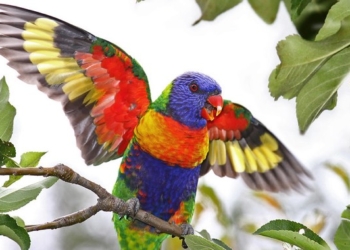
By Elias Marat | TheMindUnleashed.com
When scientists discovered the Tapanuli Orangutan in 2017, they were ecstatic. After all, these rare primates were the first great ape species to be discovered in almost a century. But now, with only about 800 of the newly-identified animals remaining, it is feared that the rarest great ape species on the planet could soon be made extinct by transnational mining operations.
The Tapanuli orangutan can be found only in a single high-elevation forest in the Batang Toru Ecosystem, which lies in North Sumatra, Indonesia. The area is rich in biodiversity, with other highly endangered species like the Pangolin and Sumatran tiger calling it home.
However, the lush rainforest of Batang Toru is also the site of a major gold-mining project by Jardine Matheson, an Anglo multinational conglomerate whose dealings in Asia date back nearly 200 years, when it trafficked opium to China from colonial India to the Pearl River Delta and directly helped deliver Hong Kong to the British imperialists.
The Hong Kong-based transnational corporation now has extensive holdings across Southeast Asia and the world, including automobile companies, dairy farms, and ownership of the Mandarin Oriental hotel chain.
But ever since 2018, when Jardine Matheson bought the Martabe goldmine on Sumatra Island, the company has been expanding its operations deeper and deeper into the Tapanuli orangutans’ environment. This has entailed the destruction of the irreplaceable Tapanuli orangutan forest habitat with projects to expand mining infrastructure including the huge massive Batang Toru hydroelectric dam project, which is meant to power the smelters of the Martabe mine.
Scientists are now warning that the damage is so great that if only eight of the Tapanuli orangutans are killed each year, the genetic diversity of the isolated great ape species would decline to the point of no return over the next decade.
Conservationist group Mighty Earth has been organizing and advocating for an end to the destruction of the Tapanuli orangutan habitat by the Martabe gold-mining project and is demanding that Jardine Matheson halt the deliberate damage being done to the forest ecosystem.
“I think this is an issue of corporate responsibility,” campaign director Amanta Hurotwitz told The Telegraph. “You have a mine in the habitat of the most endangered species of great ape… If you are going to profit off this species you have a responsibility to take action to protect the species.”
However, spokespeople for the transnational conglomerate strongly reject the claims, explaining that they strictly abide by the guidelines of local authorities, including any environmental regulations that are in place.
“The mine has not encroached on areas categorized as protected forest and has been clear on its commitment to protecting biodiversity,” a spokesperson said.
However, conservationists fear that the Tapanuli orangutan, whose unique genetic make-up and behavior delighted scientists and primatologists, could be forever lost due to the devastating carelessness and corruption that comes with corporate greed – especially in the case of such large-scale mining operations.
Hurotwitz urged the company to rethink its practices, noting that it is crucial that Jardine Matheson resolves to “work with scientists to mitigate the damage that has been done.”















